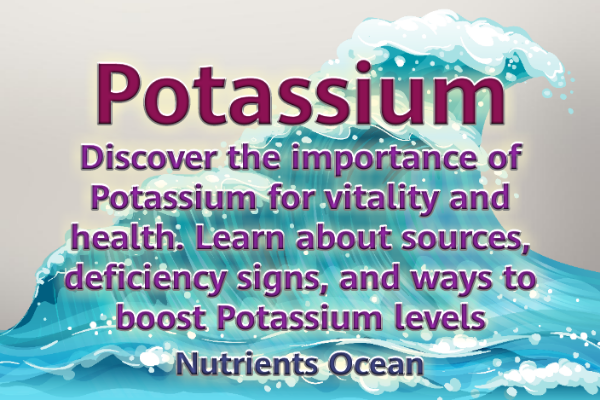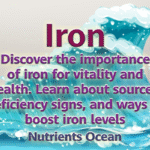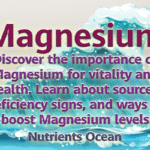Potassium
Potassium often takes a backseat in discussions about nutrition, but its importance for overall health cannot be overstated. This vital mineral plays a crucial role in various bodily functions, from regulating fluid balance to supporting nerve and muscle function. In this article, we’ll explore the numerous health benefits of potassium, signs and symptoms of its deficiency, and ways to determine if you’re lacking this essential nutrient.
The Importance of Potassium
Potassium is an electrolyte, meaning it helps conduct electrical impulses in the body. Here are some key roles it plays:
1. Regulating Fluid Balance:
Potassium works alongside sodium to maintain proper fluid balance within cells and tissues, which is essential for hydration and blood pressure regulation.
2. Supporting Heart Health:
Adequate potassium intake has been linked to lower blood pressure levels, reducing the risk of heart disease and stroke.
3. Muscle Function:
Potassium is vital for proper muscle contraction, including the heart muscle. It helps prevent muscle cramps and spasms, promoting optimal physical performance.
4. Nerve Function:
Potassium facilitates nerve impulses, allowing for efficient communication between the brain and other parts of the body.
Health Benefits of Potassium
1. Blood Pressure Regulation:
Potassium helps counteract the effects of sodium, promoting vasodilation and relaxing blood vessel walls, thus lowering blood pressure.
2. Heart Health:
Potassium supports cardiovascular health by reducing the risk of stroke, coronary artery disease, and other cardiovascular conditions.
3. Bone Health:
Some research suggests that potassium may help preserve bone mineral density, reducing the risk of osteoporosis and fractures.
4. Kidney Function:
Potassium plays a role in maintaining kidney function and may help prevent kidney stones by reducing calcium excretion in urine.
Food Sources of Potassium
Here are some food sources rich in potassium:
1. Bananas:
Perhaps the most well-known source of potassium, bananas are convenient and packed with this essential mineral. They’re also rich in vitamins and fiber, making them a nutritious snack.
2. Sweet Potatoes:
Sweet potatoes are not only delicious but also loaded with potassium. They’re versatile and can be baked, roasted, or mashed for a nutritious side dish.
3. Spinach:
Dark leafy greens like spinach are excellent sources of potassium. Whether eaten raw in salads or cooked in various dishes, spinach adds a nutritious boost to your meals.
4. Avocado:
Avocados are not only creamy and delicious but also rich in potassium. They’re also packed with healthy fats and fibre, making them a nutritious addition to salads, sandwiches, and smoothies.
5. White Potatoes:
White potatoes are another potassium-rich option, especially when eaten with the skin on. They’re versatile and can be boiled, baked, or mashed for a variety of dishes.
6. Beans and Lentils:
Beans and lentils are excellent plant-based sources of potassium. Whether it’s kidney beans, black beans, chickpeas, or lentils, incorporating these legumes into your diet can help boost your potassium intake.
7. Yoghourt:
Dairy products like yoghourt are not only rich in calcium but also contain potassium. Opt for plain yogurt without added sugars for a nutritious snack or breakfast option.
8. Salmon:
Fatty fish like salmon are not only a good source of omega-3 fatty acids but also contain potassium. Incorporating fish into your diet a few times a week can contribute to your overall potassium intake.
9. Oranges:
Oranges and other citrus fruits are not only refreshing but also provide potassium. Enjoy them as a snack or incorporate them into salads and desserts for a burst of flavour and nutrients.
10. Tomatoes:
Tomatoes are not only versatile in cooking but also rich in potassium. Whether eaten fresh in salads or cooked in sauces and soups, tomatoes add depth of flavor and nutritional value to dishes.Incorporating these potassium-rich foods into your diet can help ensurey ou meet your daily potassium needs and support overall health and well-being.
Signs and Symptoms of Potassium Deficiency
A deficiency in potassium, known as hypokalemia, can lead to various symptoms, including:
- Muscle weakness or cramps
- Fatigue and weakness
- Irregular heartbeat (arrhythmia)
-
High blood pressure
-
Constipation
-
Tingling or numbness
-
Mood changes or depression
Ways to Determine Potassium Deficiency
If you’re experiencing symptoms of potassium deficiency or are at risk
due to certain medical conditions or medications, your healthcare provider may recommend the following tests:
1. Blood Test:
A simple blood test can measure your potassium levels. However, it’s essential to note that blood levels may not always reflect total body potassium stores accurately.
2. Electrocardiogram (ECG):
An ECG can detect abnormal heart rhythms associated with severe potassium deficiency.
3. Urine Test:
Urine potassium levels can provide additional information about your body’s potassium status.
Potassium is an essential nutrient with numerous health benefits, ranging from blood pressure regulation to muscle function and heart health. Ensuring an adequate intake of potassium-rich foods, such as fruits, vegetables, legumes, and dairy products, is crucial for maintaining optimal health. If you suspect a potassium deficiency or have concerns about your potassium levels, consult with a healthcare professional for proper evaluation and guidance.
Remember, prioritising a balanced diet rich in potassium and otheressential nutrients is key to supporting overall well-being and vitality.






